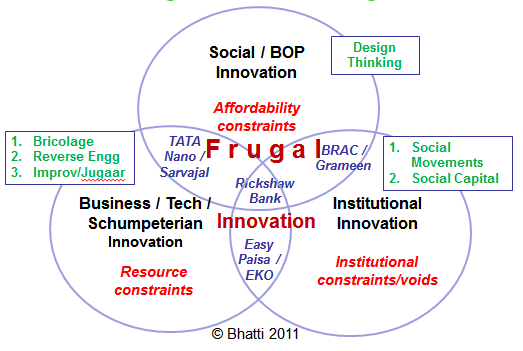Research Summary
I study innovation in emerging markets, contexts marked by institutional voids, resource scarcity, and affordability constraints. My DPhil (PhD) programme’s broad research question is “How do institutionally complex and resource constrained environments affect the discourse in innovation and the practise thereof?” I look at the particular case of emerging markets and therein the emerging field of ‘frugal innovation’. I focus on the rise of talk, practices, and policy about ‘frugal innovation’, a trend questions prevalent notions of innovation — on what is innovation, where it stems from (sources), whom to target (users), how best to achieve (design process), and how it spreads (diffusion).
This research entails understanding how localization and globalization processes are shaping innovation in and for emerging and developing market economies. Innovators in emerging markets have to devise low cost strategies to either tap or circumvent institutional voids and resource limitations to innovate, develop and deliver products and services to low income users with little purchasing power, often at mass scale and arguably in a sustainable manner. Hence, two main challenges persist in emerging nations for innovation and entrepreneurship: First is the issue of dealing with complex institutional contexts (Mair, Marti, & Ventresca 2012), institutional voids (Khanna and Palepu 1997 and others) and resource constraints and second is the issue of addressing the needs of the bottom of the pyramid i.e. the largest and poorest socio-economic segment of the population (Prahalad 2005). Despite institutional voids or complexities, emerging market entrepreneurs and firms are producing innovations which are resolving their local needs, and at the same time scaling to neighboring developing nations and even beyond to developed markets (Khanna 2008).
Through field work, interviews, and archival data, I am revealing how actors in the private, public, and community sectors are creating the market for frugal innovations — affordable, high value and sustainable solutions for local problems of global concern, often in complex environments where resources are unavailable or hard to control. These range widely in terms of core technology, focus, and impact. To date, I have inductively addressed why this emerging organizational field is gaining traction, how the space is being negotiated, and how to operationalize the practice of frugal innovation towards future deductive empirical research.
- Theory of Frugal Innovation
Based on thus far 30 plus interviews and five focus groups as well as over 150 documentary evidence of innovation from real ventures, I find that frugal innovation spans the boundaries across social, technical and institutional innovations to carve out a unique space that is enabling the development of a new field within innovation studies. Further, I find that ‘frugal’ is neither cheap nor substandard, but rather uses market forces to provide for under-served populations in the most efficient and sometimes sustainable manner. Social entrepreneurs, MNCs, communities, and states alike are involved in this market building and field generation activity which leads to as many questions as answers.

I wonder if you have heard of Paul Polak’s new ventures and what your take is on them. Windhorse International as the umbrella for four other business ventures. The first of which is Springhealth launched in India to deliver clean water. Paul is seeking to scale up to 100 million customers.
IDE, D-Rev are two previous organizations that he founded.